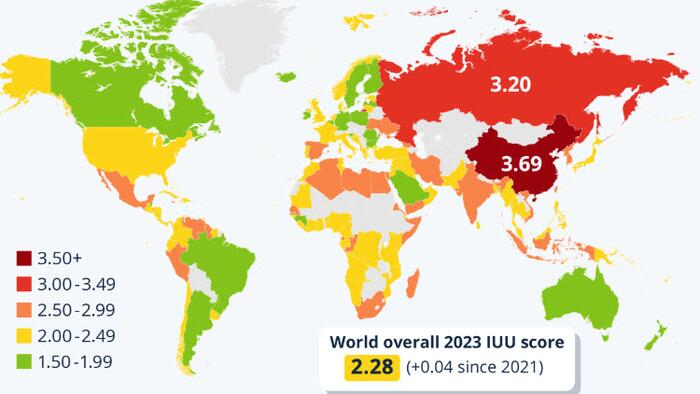The state of illegal, unreported, and unregulated (IUU) fishing has seen a concerning stagnation and, in some respects, deterioration globally since 2021, as highlighted by the 2023 IUU Fishing Risk Index. The index reports a global IUU score of 2.28 out of 5 for 2023, a slight increase from the previous score of 2.24 in 2021. Although the change in score seems marginal, it is indicative of a troubling lack of progress in addressing and mitigating IUU fishing risks worldwide. This index assesses various countries’ performance in managing their fisheries and enforcing regulations, showing that despite efforts, the overarching problem of IUU fishing remains persistent and unresolved.
According to the report, China has emerged as the worst-performing country in terms of IUU fishing practices, receiving a high score of 3.69 out of 5. This marks a slight improvement on its previous score of 3.86 in 2021, maintaining its status as a leading violator of fishing regulations for the third consecutive index review. China’s ongoing struggles with IUU fishing reflect broader systemic issues, including inadequate enforcement measures and a tendency to prioritize national economic interests related to fishing over sustainable practices. The report emphasizes that these figures illustrate ongoing challenges not just for China, but also indicate a global pattern of insufficient response to the IUU issue.
While there is a notable figure of 54 countries that improved their scores between 2021 and 2023—indicating a lowered risk environment—the improvements are overshadowed by the 93 nations that experienced a decline in their scores during this period. Countries such as Argentina, Seychelles, and Trinidad and Tobago led the way in making significant improvements, showing that concerted efforts can yield positive outcomes. Conversely, the countries that saw the most considerable declines include Peru, Sri Lanka, and Papua New Guinea, raising concerns about their commitment to sustainable fishing practices and effective governance of their marine resources.
In the context of the worst-performing nations in the index, China is joined by a mix of countries that continue to struggle with IUU fishing complications. Notably, Russia, Taiwan, South Korea, Ukraine, and Yemen have retained their places among the 10 nations identified as having the highest risk in 2023. Additionally, countries like India, Iran, Indonesia, and Comoros have emerged on the radar for IUU fishing issues, further emphasizing the need for expanded global initiatives to combat this pervasive problem. The continuing presence of these nations in the index signifies ongoing challenges in controlling fishing practices, highlighting the complexity of governance and enforcement in maritime environments.
The IUU Fishing Risk Index evaluates 152 countries with maritime coastlines, utilizing an extensive framework based on 40 specific indicators. These indicators fall into three main categories: coastal responsibilities, flag responsibilities, and port responsibilities. Coastal responsibilities refer to how well a country manages its exclusive economic zones; flag responsibilities pertain to how nations regulate and oversee their fishing fleets, and port responsibilities involve port state measures to check catches and enforce regulations upon arrival. This comprehensive evaluation aims to provide a clearer picture of each country’s performance in managing IUU fishing, allowing stakeholders to identify key areas for improvement and intervention.
In conclusion, the situation surrounding IUU fishing has not improved significantly in recent years, as indicated by the latest IUU Fishing Risk Index. Despite some countries showing an ability to enhance their scores and implement better fishing management practices, the overall trend reflects systemic failures in addressing IUU fishing globally. Countries like China, which consistently ranks poorly, underscore the challenges faced by nations in enforcing regulations and committing to sustainable practices. A more focused international effort is necessary to address IUU fishing’s complex realities, combining improvements in governance, increased enforcement capabilities, and international cooperation to foster sustainable fisheries worldwide.

